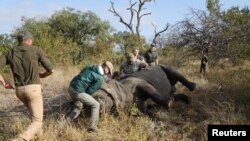Overall, 448 rhinoceros were killed across the country, three fewer than in 2021, the environment department reported.
Environment minister Barbara Creecy attributed the decline to "the relentless war that has been waged by our fearsome anti-poaching machinery as well as a comprehensive dehorning program", in which horns are removed from rhinos so they will not be killed by hunters.
The famed Kruger National Park was the only national site to report rhino poachings last year with 124 animals killed, a 40 percent drop from the 209 in the previous year.
The World Wildlife Fund for Nature (WWF) said the decline in poaching in Kruger provided "hope" and underscored the importance of dehorning programs.
"However, the transnational organized crime networks targeting large conservation areas and important rhino populations across southern Africa remain a serious concern," Jo Shaw of WWF Africa said in a statement.
But most of the rhinos were killed in the eastern KwaZulu-Natal region, which lost a total of 244 rhinos, more than double the 102 killed there in 2021. Of those, 16 were killed on privately owned reserves.
South Africa is home to nearly 80 percent of the world's rhinos, making it a hotspot for poaching driven by demand from Asia, where horns are used in traditional medicine for their supposed therapeutic effect.
The government has tightened security in Kruger, a tourist magnet bordering Mozambique that has seen its rhino population fall drastically over the past decade and a half.
"This year's outcome shows that collaboration between conservation authorities, the South African Police Services, revenue authorities and international agencies works," Creecy said in a statement.
In December, the national parks authority, SANParks, said it planned to submit park employees to lie detector tests amid concerns that some might be collaborating with poachers.
Creecy urged provincial authorities in KwaZulu-Natal to follow the national anti-poaching model "before it is too late".




